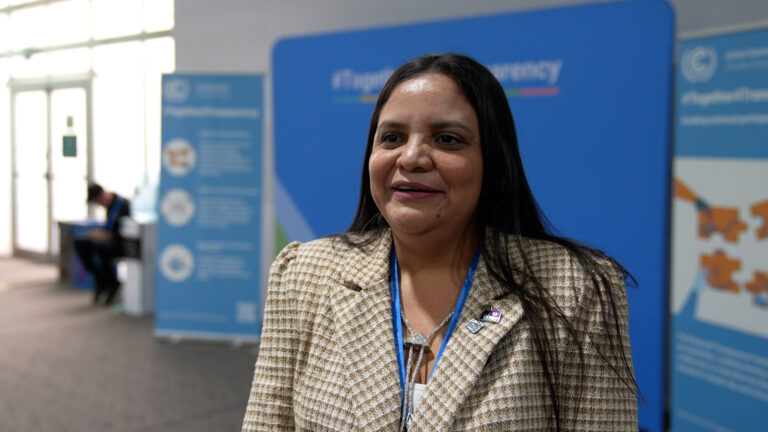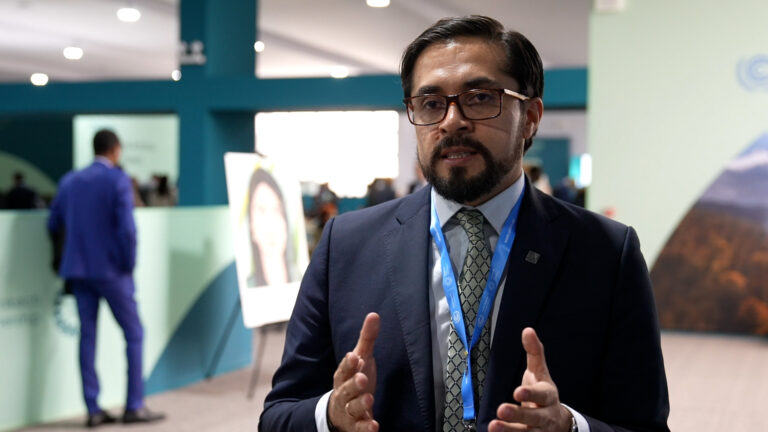Small Island Developing States (SIDS) are grappling with the immense challenges of designing and implementing their Nationally Determined Contributions (NDCs) – climate action plans under the Paris Agreement, the global pact to fight the climate crisis.
For these nations, climate resilience is not just a goal; it’s a matter of survival.
SIDS, which rely heavily on tourism, fishing, and agriculture, are bearing the brunt of climate change impacts.
Crafting NDCs is no small feat, requiring financial resources, technical expertise, and robust data infrastructure—assets many SIDS lack.
To start, Belize, in Central America, has depended on outside help to craft its NDC. “We face the challenge of lack of human resources back home, especially when it comes to the expertise needed to put together international documents,” said Edalmi Pinelo, Belize’s Chief Climate Change Officer.

In an interview with the News Room at the Baku Olympic Stadium, home of this year’s UN Climate Summit, she expressed thanks to the “organizations and partners” that have supported Belize in developing its NDC, but said the greater challenge is getting the money to implement the plan.
“…what we need is not just a perfect document but also assistance for implementation – that is more needed than to have a detailed document but we can’t implement,” said Pinelo.
Much of Belize’s population and economic activities are concentrated along its low-lying coastline. Rising sea levels threaten infrastructure, homes, and tourism-dependent areas.
For many SIDS, financial constraints are compounded by mounting debt, creating a vicious cycle that undermines their ability to address climate vulnerabilities.
“One of the main challenges is identifying priorities, knowing that whatever we decide will require funding,” said Sebastian Carranza of the United Nations Environment Programme’s (UNEP) Climate Change Programme for Latin America and the Caribbean.

“At the end of the process, many countries realise they don’t have the fiscal space or capacity to implement their plans. It’s a tough lesson—plans that look good on paper often aren’t realistic because the investments required are beyond reach.”
SIDS leaders are calling for increased international financing and technical assistance to close the gap between ambition and implementation. Many are urging wealthier nations to fulfil their commitments under the Paris Agreement, emphasizing that their survival hinges on global solidarity.
While some nations have initiated coastal protection projects, the associated costs remain prohibitive.
Without greater international support, SIDS risks falling short of its climate goals, leaving them increasingly vulnerable to climate disasters.
Guyana, though not an island, aligns itself with SIDS due to its exposure to climate risks and its ambitious climate agenda. A decade ago, it was among the poorest countries in Latin America and the Caribbean. Today, thanks to petroleum revenues, its GDP has grown by 40% over the past three years. Despite this newfound wealth, Guyana is steadfast in its commitment to sustainability through its Low Carbon Development Strategy (LCDS).
“At the time of our first national report in 2015, we were one of the poorest countries in the region, yet over 85% of our land is forested, storing 19.5 gigatons of carbon and removing 154,000 tonnes annually,” said Vanessa Benn, Stakeholder Coordinator of the LCDS.

Benn highlighted that over 80% of Guyana’s population resides on a coastal plain two meters below sea level, which serves as the nation’s economic hub.
Though the country is pursuing the development of vast oil and gas resources, she said with the LCDS, “maintenance of our forest, conservation of our natural resources, and sustainable use of those resources continue to be primary in all our national policies.”
To show that Guyana is meeting the commitments of its NDC and fulfilling the requirements of the United Nations Framework Convention on Climate Change, she said there is a need for “continual upgrade of our technical capacity.”
This, she said, will enable Guyana “to be able to do the reporting” to show that across the various sectors – such as transportation, agriculture or forestry – Guyana is implementing what it committed to in its NDC.
As Guyana and other vulnerable nations press for meaningful partnerships and resources, their fight underscores a grim reality: without robust global action, climate change threatens to outpace their ability to adapt. The stakes, for SIDS and the world, have never been higher.
—
This story was originally published by News Room, with the support of Climate Tracker’s COP29 Caribbean Climate Justice Journalism Fellowship.